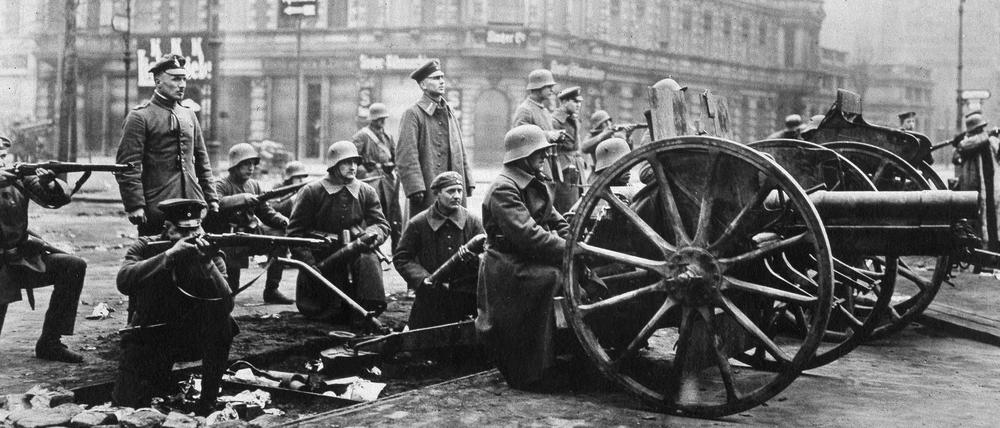feedmegin posted:Well, you say that. The SA had something like 10 times the authorised strength of the Reichswehr at the time? Which is where Roehm's coming from. If it weren't for the Night of the Long Knives things might have gotten Spicy.
|
|
|
|
|

|
| # ? Jun 4, 2024 19:46 |
|
Nessus posted:I suspect there was a certain disparity in the quantity of automatic squad-based firearms Oh, absolutely. The SA were a mob of thugs. Quantity still has a quality of its own mind you.... (And I will remind you that formally the Reichswehr weren't allowed things like tanks, or aircraft. It's a lot more even than it would be in e.g. a modern US context) feedmegin fucked around with this message at 15:44 on Jan 3, 2023 |
|
|
|
T___A posted:The Nazi Dictatorship by Ian Kershaw gives a very nice overview of all the debates in the historiography of Nazi Germany and the Holocaust. But the TL;DR is that most historians these day fall on the functionalist side of things but with an emphasis as Hitler's meddling as an accelerant: That's such a weak formulation of the Sonderweg that it's basically homeopathic. At that point you're just acknowledging that historical specificity is a thing and local contexts do matter. The key with the capital-S Sonderweg thesis is that it's a very 1950s formulation that lays out a "normal" path of enlightened, liberal, (mostly democratic), western European progress that arcs from ~Locke/French Revolution through WW1. It starts from the basic presumption that, because Nazism and the Holocaust happened in Germany, Germany must have had an abnormal development because everyone knows that such a thing could have never happened in an enlightened, democratically liberal country like 1900 France or England or the US. It's an abnormal experience of modernity that malforms German culture in a way that Hitler is possible, and the Sonderweg then becomes about tracing back to find out why/how that happened. The more common formulations get back to around Napoleon and talk about Prussian absolutism, but I've seen it taken all the way back to the Reformation and Luther. The version that Browning uses just recognizes that the Holocaust as it historically happened was fundamentally German in origin (although he goes to pains to point out the active role taken by non-German participants) and as such is rooted in the specific history of Germany. But that's no more so a "special path" than France has a "special path" or the US does - it's just recognizing that the local history shaped the way it developed and played out. The basic purpose of the Sonderweg question to begin with isn't to answer "how" the Holocaust happened, or even "why" but "why Germany." And it fails at that, because the core assumption that there was a "normal" progression to modernity that Germany somehow missed is flawed to begin with.* It's a comforting "this could never happen here" kind of answer, but a flawed one. Browning's expressed something similar in comments that if you went back in time to 1910 and told Europeans that the Holocaust would happen and it would happen in Europe, most people would probably guess Russia or France. *this is a whole thing in Anglo-American history, that basically projects the US and English experience of democratic reform in the 19th century and projects it onto the Continent. Lots of highlighting the French Revolution, lots of highlighting Napoleon's reforms, lots of seemingly forgetting that the years 1814-1848 and 1852-1870 existed in France. I mean, people point to the Third Republic like it was some kind of hard bastion of democratic tradition but by the time it fell apart after WW1 it was only 70 years old and the last couple of decades weren't exactly high water marks of stability. The reality is that there was no singular "normal" progression from absolutism to democracy, and that in all the countries that made that journey it was very winding with lots of weird digressions, back steps, and unique factors that just end up boiling down to every country having its own historical experience.
|
|
|
|
Nessus posted:I suspect there was a certain disparity in the quantity of automatic squad-based firearms ugh I just lost a longer post, but they also were lacking in basic small arms like rifles. Severely lacking. They were also really, really untrained. The military was actively worried about them getting folded into it, because of the training nightmare it would entail. That said, one of the things that precipitated the 1934 crisis was a rumor that the SA had a cache of heavy weapons (LMGs, HMSs, mortars, small howitzers). The army was worried about that and it's part of what made them put the pressure on. Still, I don't think there's any good evidence that this was more than rumor.
|
|
|
|
Cyrano4747 posted:That said, one of the things that precipitated the 1934 crisis was a rumor that the SA had a cache of heavy weapons (LMGs, HMSs, mortars, small howitzers). The army was worried about that and it's part of what made them put the pressure on. Still, I don't think there's any good evidence that this was more than rumor. Given that in the street fighting in the years immediately after WWI the Freikorps had all kinds of weapons, up to and including heavy machineguns:  Artillery:  Flamethrowers:  And Beutepanzer (captured tanks):  I don't think this was an entirely fantastic fear. The streets of Berlin were awash in weapons in 1919-20, the idea that some had been secretly stockpiled isn't absurd.
|
|
|
|
But the Freikorps were actually armed by the state, weren't they?
|
|
|
|
Fangz posted:But the Freikorps were actually armed by the state, weren't they? Some militias certainly were armed by the Republic to fight Communists, but the militias they fought against obviously weren't. Many ostensibly pro-government units, especially in the east, were pretty much autonomous and didn't take orders from that government, fighting where and when they chose. There was little or no control until von Seeckt took over the Reichswehr and cut their support and funding. Again, post-Germany was flooded with weapons. A decade later it wouldn't be completely unreasonable for someone to think that perhaps some of those weapons had wound up in the hands of SA.
|
|
|
|
feedmegin posted:Well, you say that. The SA had something like 10 times the authorised strength of the Reichswehr at the time? Which is where Roehm's coming from. If it weren't for the Night of the Long Knives things might have gotten Spicy. Read this wrong for a second and thought the forums were getting real for a second.
|
|
|
|
Cessna posted:Given that in the street fighting in the years immediately after WWI the Freikorps had all kinds of weapons, up to and including heavy machineguns: There was a MASSIVE arms confiscation and destruction program starting in 1920, and it was overseen by foreign observers. Basically once the immediate thread of another Communist revolution was passed England and France in particular wanted that poo poo gone. Exact figures on the number of destroyed weapons are hard to come by (you'll usually see 5 million small arms cited, but god only knows what it was for heavier stuff), but it's actually a bit of a problem for people who collect WW1 German stuff because of how many variations of poo poo went into the smelters almost entirely. For example, there was a wartime update of the Gew 88 known as the Gew88/14 (as opposed to the pre-war Gew88/05 updates) that is mostly accepted to have existed, but some people will still argue about it. I think there are like 5 confirmed examples. Most of them got scrapped because they were panic rebuilds during the 1914 rifle shortage, and the Weimar state preferred to keep more modern rifles like the Gew98. There was also a general amnesty at the time for weapons that had walked home from the front and rewards for turning in heavy weapons - HMGs, mortars, artillery. The guns that the German state was allowed to keep had a "1920" property mark slapped on them to indicate they were accounted for under the treaty terms. Here's a Luger that got that treatment:  The date below is the actual manufacture date, the date above is the treaty mark. Now, were there still caches around? Sure. There was one just found in Munich that was probably stashed by the KPD, and the various right wing orgs had them too. But they were way, way thinner on the ground than they were in the 1918-20 window.
|
|
|
|
Grey Hunter posted:Read this wrong for a second and thought the forums were getting real for a second. Same. Every single time they come up.
|
|
|
|
Rocko Bonaparte posted:Same. Every single time they come up. I have the reverse reaction every time I see "SA" used in normal forums contexts lol.
|
|
|
|
Cyrano4747 posted:There was a MASSIVE arms confiscation and destruction program starting in 1920, and it was overseen by foreign observers. Basically once the immediate thread of another Communist revolution was passed England and France in particular wanted that poo poo gone. Exact figures on the number of destroyed weapons are hard to come by (you'll usually see 5 million small arms cited, but god only knows what it was for heavier stuff), but it's actually a bit of a problem for people who collect WW1 German stuff because of how many variations of poo poo went into the smelters almost entirely. For example, there was a wartime update of the Gew 88 known as the Gew88/14 (as opposed to the pre-war Gew88/05 updates) that is mostly accepted to have existed, but some people will still argue about it. I think there are like 5 confirmed examples. Most of them got scrapped because they were panic rebuilds during the 1914 rifle shortage, and the Weimar state preferred to keep more modern rifles like the Gew98. This is technically more a TFR question so sorry, but what they hell do they use to etch those numbers in? ("etch" was the closest neutral word I could come up with) They look very neat and with the numbers we're talking about I'm assuming this wasn't done by hand. Are these getting run back through whatever machine process would have put in things like makers' marks and serial numbers or is this a weird bespoke thing? That gun doesn't look like it was made of all-stamped metal, so I'm assuming that happens after it's already "gun-shaped". I'm just impressed by the problem of having thousands (tens of thousands?) of a kind of gun and needing to put a little "1920" on it and then put it back. That sounds like a logistical nightmare.
|
|
|
|
99% sure those are stamped in.
|
|
|
|
|
Yeah, those were probably stamped.
|
|
|
|
Yeah, stamp with a punch. I would assume if everything is getting the same number that you just have a "1920" stamp (and given the consistency between them that I've seen I'm pretty sure that's what it was) but you can also do the same thing with a jig and a bunch of individual numbers. I'll post two examples of that in a second. If you look at the numbers you can see where the metal was displaced by the punch. Look between the up-swept serif on the 2 and the corner formed by the upward sweep and the lower leg. See how the metal looks humped up? That's displaced material from the punch. This is also one of the big giveaways for identifying fake numbers on guns. Either the font of the modern punch doesn't match the font used on the old punches, or the font is right but it was engraved and if you look closely enough you can spot the difference between a punched and engraved number.
|
|
|
|
Cyrano4747 posted:Yeah, stamp with a punch. I would assume if everything is getting the same number that you just have a "1920" stamp (and given the consistency between them that I've seen I'm pretty sure that's what it was) but you can also do the same thing with a jig and a bunch of individual numbers. I'll post two examples of that in a second. Here are a few examples. This is an early war Mauser Oberndorf gun. I note the factory because both fonts and the amount of gently caress they gave about number alignment varies considerably between factories. Mauser was pretty meticulous.  If you look carefully there is a slight bit of variation in spacing that indicates it was done by hand, but it was done carefully and with some kind of guide. The k suffix is a little slap dash though. Here's an example from a very late war Vokssturm rifle made by Steyr (who tended to have sloppier serials to begin with)  Note that the numbers aren't in a good line, the spacing is wonky, and also note the tilt to the right. My understanding is that if you're right-handed that can happen if you grab a punch out of a tray and don't check your alignment. Something about the most natural angle to grab a thing vs. hold it vertically in your fist like you do if you're going to strike it with a hammer. Don't take my word on that, though, it's just something that an old guy who knew about guns and tools told me once. Now for the real comedy option have a 1943 Enfield where someone clearly gave ZERO fucks and was just slapping numbers on there as fast as they could: 
|
|
|
|
Cyrano4747 posted:Now, were there still caches around? Sure. There was one just found in Munich that was probably stashed by the KPD, and the various right wing orgs had them too. But they were way, way thinner on the ground than they were in the 1918-20 window. I'm sure it wasn't a legit threat, just that conspiracy theories about the early Nazis getting their hands on weapons are understandable.
|
|
|
|
Ah once again being ignorant gets me a bunch of cool posts to read. Thanks a mill!
|
|
|
|
Xiahou Dun posted:Ah once again being ignorant gets me a bunch of cool posts to read. Agreed, props to Cyrano's small arms info.
|
|
|
|
Cyrano4747 posted:There was also a general amnesty at the time for weapons that had walked home from the front and rewards for turning in heavy weapons - HMGs, mortars, artillery. I really, really want to know more about how somebody just walks home with an artillery piece and what exactly they expected to do with the thing once they got it home.
|
|
|
|
Tomn posted:I really, really want to know more about how somebody just walks home with an artillery piece and what exactly they expected to do with the thing once they got it home. The running gag from MASH about Radar shipping a jeep home one part at a time comes to mind. But there were a lot of smaller field pieces that would be really useful in urban warfare but you could transport with a horse. And people don't really question someone in a uniform moving military equipment. And either they planned nothing good, or had no plan what so ever.
|
|
|
|
If youíre taking a horse home with you, might as well have it pull something. I imagine there was a lot of horse theft.
|
|
|
|
|
Tomn posted:I really, really want to know more about how somebody just walks home with an artillery piece and what exactly they expected to do with the thing once they got it home. In my experience, people will steal absolutely anything you can possibly imagine, up to and including the nails which were holding it down. Bad decisions have a momentum all their own.
|
|
|
|
Tomn posted:I really, really want to know more about how somebody just walks home with an artillery piece and what exactly they expected to do with the thing once they got it home. Ask all those Ukrainian farmers that are the proud owners of one (slightly used) T-whatever.
|
|
|
|
I'm continuing to read Wages of Destruction. At one point the author notes that non-slave, non-German workers in the German empire (e.g. France, Poland, etc) had substantially lower productivity than German workers. But they don't go into why that was the case, except to note that this productivity deficit was gradually fixed over the course of 1941/1942. I can think of two reasons why such workers might have had lower productivity, but I'd love to hear if someone actually knows the answer. The first reason is simply lack of motivation: you've been conquered and now you're expected to make weapons/whatever for your new overlords? If I were in that position I'd certainly be inclined to slack off. The second is that they were confiscating most of the food to feed Germans, not foreigners...if you're getting short rations, then it's hard to do your job properly. The book does mention this being an issue specifically in the context of slave/impressed laborers, who had pretty miserably poor diets, but I don't remember the diets of other workers being mentioned. On a related note, what made the continental harvests during wartime so terrible? Lack of fertilizer? Lack of labor? Just bad luck?
|
|
|
|
Just a guess but the same nitrates that make fertilizer are also an important ingredient for HE. Could be a lack of materials. Also iirc they imported a bunch of nitrates in general. Iíve got something loving the back of my brain about Switzerland and both selling chemicals to the Nazis and facilitating the import of them.
|
|
|
|
I'm pretty sure the blockade stopped all nitrate imports in WW1, so the Haber process became The Thing that allowed Germany to fight the war at all.
|
|
|
|
VostokProgram posted:I'm pretty sure the blockade stopped all nitrate imports in WW1, so the Haber process became The Thing that allowed Germany to fight the war at all.
|
|
|
|
TooMuchAbstraction posted:I'm continuing to read Wages of Destruction. At one point the author notes that non-slave, non-German workers in the German empire (e.g. France, Poland, etc) had substantially lower productivity than German workers. But they don't go into why that was the case, except to note that this productivity deficit was gradually fixed over the course of 1941/1942. I can think of two reasons why such workers might have had lower productivity, but I'd love to hear if someone actually knows the answer. The first reason is simply lack of motivation: you've been conquered and now you're expected to make weapons/whatever for your new overlords? If I were in that position I'd certainly be inclined to slack off. The second is that they were confiscating most of the food to feed Germans, not foreigners...if you're getting short rations, then it's hard to do your job properly. The book does mention this being an issue specifically in the context of slave/impressed laborers, who had pretty miserably poor diets, but I don't remember the diets of other workers being mentioned. I believe the book later goes into detail about how rations were used as motivation - the standard was in fact substandard, and intentionally underfeeding non-Germans was to varying degrees explicit policy, in order to contrast good food held out for performance.
|
|
|
|
TooMuchAbstraction posted:On a related note, what made the continental harvests during wartime so terrible? Lack of fertilizer? Lack of labor? Just bad luck? I recall some discussion about German agriculture of the period being heavily reliant on small family farms that used a lot of manual labor instead of machinery. Probably not helped by the delayed movement to a war economy. Did Nazi Germany have an equivalent of the Land Girls?
|
|
|
thatbastardken posted:I recall some discussion about German agriculture of the period being heavily reliant on small family farms that used a lot of manual labor instead of machinery. Probably not helped by the delayed movement to a war economy.
|
|
|
|
|
Nessus posted:Not only did they have a lot of those, they valorized them as a sturdy root of solid Aryan virtue and so forth. Naturally, their Aryan virtue production was more important than, you know, crops. Itís really handy how Fascism kneecaps its long-term ability to function. I mean, eventually. Sucks shhiiiit the rest of the time.
|
|
|
|
thatbastardken posted:I recall some discussion about German agriculture of the period being heavily reliant on small family farms that used a lot of manual labor instead of machinery. Probably not helped by the delayed movement to a war economy. Rather than encouraging more women to farm, the Germans exempted more male farmers from military service. More impactful than this was the scores of slave labourers they collected in occupied Europe. Like, millions of them, far more than any volunteer drive could accomplish. I think pop culture imagines them mostly in factories, possibly making V2s, but the reality was that most were sent to the horribly inefficient agricultural sector to grind away on meagre rations
|
|
|
|
TooMuchAbstraction posted:On a related note, what made the continental harvests during wartime so terrible? Lack of fertilizer? Lack of labor? Just bad luck? The book goes into more detail on this later, but yes fertilizer getting blockaded had a major impact on continental harvests as their agricultural sector was heavily reliant on those. There were also knock-on effects elsewhere - fuel shortages for instance meant the demechanization of farms in France if I recall correctly. In general the book points out that the French economy depended heavily on imports and its colonial empire for raw materials and being subjected to the blockade once it became a part of the Nazi economy threw everything into a tailspin and meant that capturing the factories of France didn't mean as much for the Nazis as it did on paper since there just weren't the raw materials necessary to feed them. Slim Jim Pickens posted:Rather than encouraging more women to farm, the Germans exempted more male farmers from military service. Doesn't Wages of Destruction make the point that the Germans didn't actually NEED to encourage more women to farm because women already made up a major part of the pre-war agricultural labor force, more so than in Britain for instance? Kinda goes hand-in-hand with small inefficient family farms really, the "family" part of it DOES imply that women are going to be involved...
|
|
|
|
Yeah Wages of Destruction specifically points out the fallacy that England was more willing to utilize the entire potential of its workforce by letting women enter the workforce while the Germans did not. This is a fallacy because Germany couldn't expand this, since it was something they had already done. So yeah, on paper the British increased their workforce more than the Germans, but only because they were just catching up to the Germans and the only thing that got counted was the percentage increase during the war.
|
|
|
|
A note about the import of fertilizer to Europe and the value of the haber bosch process: European indigenous farming methods diverged from global standards in the early modern era by becoming much harsher on the soil - or perhaps more accurately, not becoming less harsh on the soil. If Europe hadn't y'know colonized a lot of the world, they probably would have changed track significantly (Denmark did notably, it just turned out out to not matter because of that whole 'new world' thing). Europe has a long-term decline in agricultural productivity for much of modernity. It's not much of an exaggeration to say the Haber Bosch process is the triumph of modern chemistry as a field. Sources: Mauro Ambrosoli, The Wild and the Sown Piers Blaike & Harold Brookfield, Land Degradation and Society
|
|
|
|
thatbastardken posted:I recall some discussion about German agriculture of the period being heavily reliant on small family farms that used a lot of manual labor instead of machinery. Probably not helped by the delayed movement to a war economy. This lot https://en.wikipedia.org/wiki/League_of_German_Girls are roughly the Nazi Girl Guides (except joining wasn't optional). They had to do a year of labour service, usually on a farm (this pre-war as well as during it).
|
|
|
|
Grey Hunter posted:Read this wrong for a second and thought the forums were getting real for a second. We-ell, having a quick look at that little bit at the top of the forums - '207,428 users total.' So we ourselves are a little over two Reichswehrs.
|
|
|
|
has there ever been a sword and pistol fighting style or is that solely a hollywood thing? By which i mean, sword in one hand, pistol in the other.
|
|
|
|

|
| # ? Jun 4, 2024 19:46 |
samcarsten posted:has there ever been a sword and pistol fighting style or is that solely a hollywood thing? By which i mean, sword in one hand, pistol in the other.
|
|
|
|







































